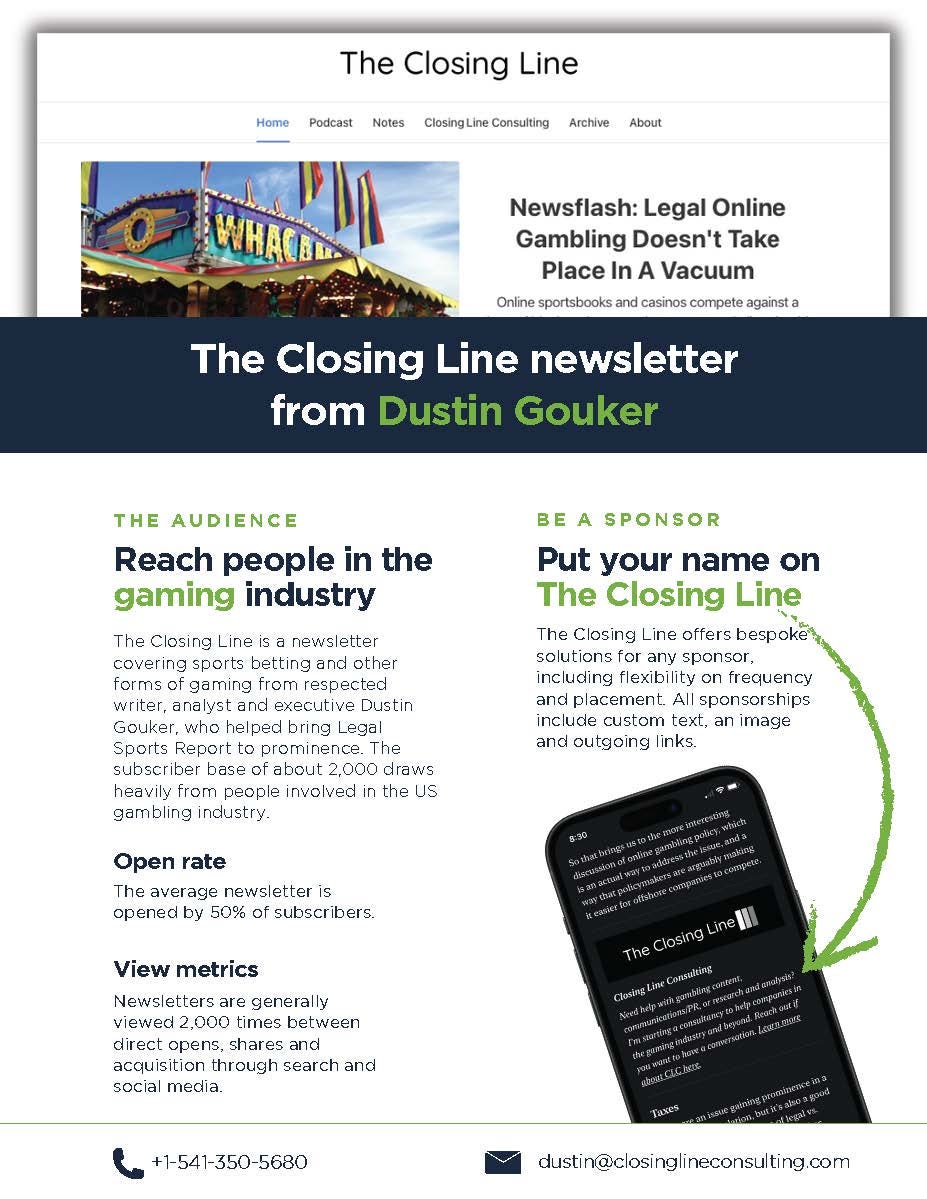TCL will offer analysis in the US gambling space in The Takeaway every Thursday.
The topic of the day is once again banning college player prop bets in the United States. New Jersey is considering the issue with a new bill that would outlaw bets that revolve around the performance of a college athlete — a player’s number of touchdowns, points scored, etc.
In a vacuum, is it a terrible idea to ban these types of bets? Not really. It takes the focus off of specific 18-22-year-olds playing in sports; I can get behind the concept.
The problem is that sports betting doesn’t happen in a vacuum. A ban on these kinds of bets — if a prohibition proliferates around the country — doesn’t solve many of the core issues. For starters, we’re still going to see player props in many states at offshore and sweepstakes sportsbooks, as well as fantasy pick’em apps. And while legal gambling is almost certainly responsible for some increase of harassment of athletes, it’s far from the only reason why people choose to harass athletes via social media, according to the NCAA’s research.
Seton Hall Law School is excited to offer the 6th Annual Gaming Law, Compliance, and Integrity Bootcamp on March 3-4, 2025.
Our Bootcamp promotes essential legal compliance and integrity in the gaming industry by providing high-quality and robust legal, compliance, and ethics education.
Attendees will examine gaming-related laws and regulations alongside other compliance, ethics & integrity officers, legal counsel, gaming consultants, and regulatory professionals.
Be part of the conversation shaping the future of gaming. Register today.
(This program offers CLE and CCB credit)
What a ban does accomplish is continue down the path of trying to make legal sports betting worse without a whole lot of thought to what’s happening in the real world. This week we’re also seeing Louisiana considering raising its tax on sports betting revenue to 51%. I plead with states not to raise taxes just because they can.
The problem also is not New Jersey and Louisiana doing these things on an island; the problem is if these measures start leading to wider adoption. 1. A 51% tax rate across the board is not sustainable. 2. A ban on college player props hurts the legal industry and doesn’t meaningfully address the real issue. 3. No one is going to like it if we end up with substantive limitations on sports betting advertising.
I know it’s asking a lot, but what we should be doing is having constructive discussions about how legal sports betting should be now that we’ve had six years of an expanded industry:
Taxes: Can we all agree that maybe 10% is too little, and 51% is too much? When lobbyists first started barnstorming around the country trying to pass laws, they were pitching the industry as a very low-margin business, often based on the historical hold in Nevada. Now, however, blended hold across the country is much higher than that threshold, mostly because of the rise of parlays, same-game and otherwise. At the same time, it’s quite clear we would have a terrible industry if half of all revenue was going to state governments. Can we have a realistic discussion about what a place in between the two extremes is? Probably not, but I can hope.
College betting prohibitions: Prohibitions on things in the legal US sports betting ecosystem — outside of age and geography — are in some ways performative. It’s easy to gamble on anything you want, in sports or otherwise, if you want to. (To be clear I am not advocating that we should be able to bet on high school football or the Little League World Series, but you can bet on them, if you choose to.) I’d argue that bans on stuff related to college sports won’t meaningfully help game integrity in the current landscape. And if your goal is to stop harassment, working with social media platforms to ban offending users would arguably be a more effective solution but requires some actual work to be done. I hope we get past the idea that banning bet types means we’ve “solved” the issue. Sidenote: we’re also moving to a world where bans on election betting seem quaint.
Advertising: If you think there’s not too much sports betting advertising in the US, you almost certainly work for a sportsbook. It would be cool to have an honest chat about the pervasiveness of sportsbook commercials and branding, and see if there's some way it can be toned down short of policymakers getting involved. It’s not an easy question to tackle, and sportsbooks should also be able to advertise when and how they want (within reason). But for the good of the industry, it would be great to see some movement here.
The bottom line: I would love to see policymakers and the sports betting industry work together to make the industry better, rather than the former just finding new and innovative ways to make the legal industry worse.
Closing Line Consulting
Need help with gambling content, navigating the North American gaming industry, communications/PR, or research and analysis? I have a consultancy to help in gaming and beyond. Reach out if you want to have a conversation. Learn more about CLC here. For sponsorship inquiries, email dustin@closinglineconsulting.com.







